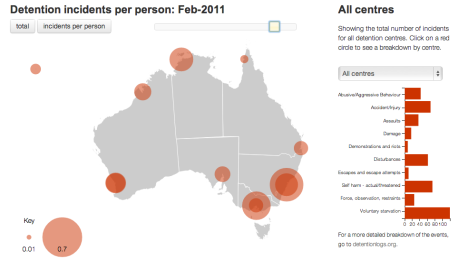Journos create data journalism experiment Detention Logs
Three young freelance journalists, who invested hundreds of hours in decoding and reformatting thousands of Department of Immigration records, are behind one of the largest data journalism projects in Australian history.
On Monday the trio, consisting of Luke Bacon, Lawrence Bull and Paul Farrell, launched a new data resource consisting of more 7000 incident logs from detention centres around Australia.
The website Detention Logs is a project launched in conjunction with online news websites The Global Mail, The Guardian and New Matilda, with each media outlet allowed to draw news stories and data for visualisation from the records ahead of the launch.
The records, obtained under Freedom of Information Laws, shows data from October 2009 to May 2011 and reveal details of self-harms, hunger strikes, assaults, deaths, deportations and escapes in detention facilities.
Paul Farrell, co-founder of Detention Logs, told Mumbrella the trio hope the website could serve as a model for future open journalism projects.“We think the website is very important for open journalism and also for contributing to quality public debate in Australia,” said Farrell.
“There is a real lack of information detention centres in Australia and the public will be able to really benefit.”
The project came about after the trio came across a document containing a summary of incidents on the Immigration Department’s disclosure log, where it posts Freedom of Information requests last year.
“It was this 300 page pdf file and we saw the document and thought it was pretty interesting”, said Farrell. “We asked the Department if they would release it in a tabulated format and they refused, so we set to work going through it and putting it into a format that we could turn into a database or dataset,” he said.
“Over the last six months we’ve slowly been doing that. I would say there have been hundreds of hours, between the three of us that we have put into that.”
Editor of The Global Mail Lauren Martin told Mumbrella they were approached by the trio and were eager to be involved when they saw the resource that had been created.
“They approach us and asked if we wanted to be involved in a collaboration and we were really happy to be involved,” said Martin.
“I think on our website and on other websites, news stories will come of it. You can already see The Guardian and New Matilda have done some stories on the totals.”
The Global Mail has used the data to create a data visualisation which allows users to flag key incidents.
“What I love about the visualisation (on our website) is that it changes as people use it,” said Martin.
“Everyone who uses it can make a visual footprint on it and flag incidents so they brighter on the screen for the next person. Over time the visualisation will change.”
The Guardian’s Australian website has also used the records for data visualisation purposes mapping various incidents over two years.
Katharine Viner, editor-in-chief of The Guardian Australia, told Mumbrella the appeal of the project was both its public interest value and also its open journalism element.
“We were instantly interested in the project, both for its public interest value and its open journalism element. It is the most comprehensive dataset ever published about Australia’s detention network,” said Viner.
One of the other key impact of the project has been to encourage people to file Freedom of Information requests with the Department of Immigration over incidents that concern them.
FOI online tool Right To Know has already logged close to 50 such requests in just two days.
“They are really just our pre-existing facility to make it easy for other tools to hook into our website,” said Matthew Landauer, director and co-founder of OpenAustralia, which manages the FOI website.
“We’ve really wanted people to build these sorts of tools and we are really excited to see this sort of project.”
The Department of Immigration was less positive, arguing that it could create more work for its staff. Sandi Logan, national communications manager with the DoI, told Mumbrella: “We welcome any and all efforts to demonstrate accountability, transparency and the ‘open book’ that is the department’s operations.
“We are already the most FOIed department in the public service and it puts an enormous load on our FOI section. This could well add to that workload.”
Nic Christensen





And yet another reason why the current boat people policy is an unmitigated disaster… http://www.heraldsun.com.au/ne.....6662780447
“Boat People”? I think the term you’re looking for is “Asylum Seeker”.